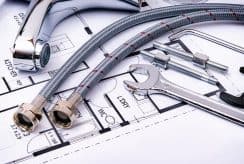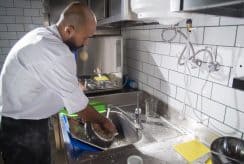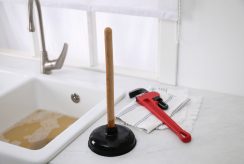Epoxy flooring is a tough and durable material that protects concrete floors in heavy traffic areas. It also reduces maintenance costs and downtime due to damage.
Hallways and corridors are crucial to many businesses and facilities. Closing them for cleaning or repairs is expensive and disruptive.
Epoxy floors are highly resistant to chemicals and other spills, making them an ideal option for industrial settings. They also create an impenetrable seal that prevents stains.
Abrasion Resistant
Floors that see a lot of foot and machine traffic, especially in high-traffic areas such as corridors, demand a flooring surface that can take the heat and stand up to impact. Epoxy floors offer that and more. The durable epoxy coating creates a tough, seamless surface that can withstand constant foot and vehicle traffic without showing any signs of wear. It also can withstand heavy loads and sudden impacts from objects like forklifts, without cracking or chipping.
This resilience makes epoxy the go-to choice for industrial and commercial spaces that prioritize hygiene, strength, and longevity. The slick, easy-to-clean surface also eliminates the need for any grout or caulking, which could attract dirt and bacteria.
The slick, seamless quality of an epoxy floor also ensures that any spilled chemicals, solvents or other substances will not soak into the concrete underneath it. This helps prevent corrosive chemical spills and reduces the need for costly replacements or repairs.
An epoxy floor is an investment, so it’s important to choose the right one for your needs. Durability tests can help you understand how well a particular floor material will perform under specific conditions, such as abrasion resistance or chemical resistance. A variety of durability tests are available to evaluate a flooring system, including immersion and spot test, so it’s important to find out which ones are relevant for your specific space.
Chemical resistance testing examines how well an epoxy floor can withstand chemical spills and other corrosive substances. It involves submerging a sample of the flooring in different chemicals for a specified amount of time, then assessing it for any damage. This is a good way to get a feel for how the flooring would hold up in a real-world chemical spill situation, but it’s important to know that other factors can also play into the flooring’s performance.
Before applying an epoxy coating, it’s crucial to have the concrete floor cleaned and prepared properly. Moisture is the biggest enemy of epoxy, and any lingering vapor or liquid can interfere with the adhesive bond and slow or stop the curing process. If you’re installing an epoxy flooring in a damp environment, it may be a good idea to use an epoxy accelerator to speed up the curing process.
Durable
Epoxy flooring is extremely durable, which is why it’s a great choice for heavy traffic areas. It can withstand the impact of vehicles, machinery, and even dropped materials without sustaining damage. The flooring is also impervious to chemicals, meaning that any spills will be quickly and easily cleaned up. It’s important to note that the durability of an epoxy floor depends on a number of factors, such as its initial installation and maintenance practices. For instance, floors that are regularly maintained and free from abrasive particles will experience a longer lifespan than those that are neglected.
It’s also vital to ensure that the slab on which the epoxy is being installed is in good condition and not contaminated with grease, oil, wax, or paint. If any of these substances are present, it can interfere with the adhesive bond of the epoxy with the slab, and this can lead to premature failure of the floor. Moisture in the concrete slab is another big factor that can cause epoxy floors to fail, and if this is not addressed adequately, it can result in adhesion failure, cracking, and chipping.
Fortunately, these problems are avoidable with proper subfloor preparation and thorough application of the epoxy coating. By grinding the surface, removing any coatings, and cleaning the substrate thoroughly, the floor can be prepared for an effective bond. Additionally, the epoxy mixture must be applied in accordance with the manufacturer’s instructions in order to achieve maximum durability.
Epoxy is a versatile flooring option, and it can be customized to meet the needs of any space. For example, the use of metallic pigments can create a beautiful visual effect on the floor while creating a durable and long-lasting surface. Other decorative options for the floor include creating a custom flake pattern, embedding a corporate logo, or using a contrasting color scheme to create a bold design.
In addition to its versatility, epoxy is a great option for high traffic areas because it can be installed in place of a traditional tiled or concrete floor. This means that corridors can be closed for less time while the new floor is being put in place, which is a major benefit when it comes to facility management.

Versatile
Epoxy flooring is a versatile surface coating that can be used in commercial or industrial environments. Its seamless finish provides a sleek, polished appearance that is often preferred over other options for spaces where cleanliness and durability are top priorities. Additionally, epoxy coatings can be customized to suit specific aesthetic requirements.
For example, some coatings contain color flakes to add visual appeal. These flakes are not just decorative, however; they also help to make the floor more slip-resistant. This is a crucial attribute for areas that may experience a lot of vehicle traffic or have potential exposure to chemicals and other substances that can be dangerous if they come into contact with skin.
Furthermore, epoxy floors can be formulated with additives to provide an anti-static property. This helps to reduce the build-up of static electricity that can cause a nuisance and even damage electronic equipment.
In addition to this, epoxy floors can be made water-resistant. This is a particularly important trait for industrial environments that may experience flooding or the accidental spilling of toxic liquids such as oil or chemicals. This feature can save businesses a significant amount of money as it will prevent costly cleanup and repair work in the future.
When properly cured, epoxy will form an impenetrable seal that is completely resistant to water damage. It can also withstand the effects of temperature changes, making it a great option for warehouses or other industrial environments that are subject to frequent fluctuations in air temperature.
When it comes to high-traffic areas, epoxy flooring is one of the best options available. It is able to withstand the rigors of regular foot, vehicle and machinery traffic with ease and will hold up well for years to come. It is also an affordable solution, compared to other flooring options that require frequent waxing and recoating. Additionally, it is easy to clean and maintain, which can further reduce the cost of ownership. This is why more and more companies are turning to epoxy flooring as a practical, stylish choice for their workplaces. For more information about how epoxy can be incorporated into your business, check out their epoxy service map listing.
Easy to Clean
If you are looking for flooring that is easy to clean and can stand up to heavy traffic, epoxy floors may be the perfect choice. They are easy to sweep and vacuum and can be cleaned using a variety of commercial and industrial cleaning products. You can also use a kitchen sponge or soft deck brush with warm water to remove any stains, including those caused by automotive fluids (oils, anti-freeze) and metal hardware. These can be wiped or washed off the floor and should always be rinsed thoroughly so they don’t leave any residues behind that could damage the epoxy coating.
Epoxy can withstand heavy loads without wearing down, making it a great option for areas where forklifts or vehicles move around frequently. In addition, the epoxy can be modified with slip-resistant aggregate to create a non-slip surface. This can be important for areas that are regularly used by automobiles, such as garages or showrooms.
As with any type of flooring, it is essential to maintain your epoxy floor in order to keep it looking its best. Regular sweeping or vacuuming will help to keep the floor free from debris and dirt that can damage the finish and cause scratches and dullness. If your floor has a lot of foot traffic, it may be a good idea to invest in some heavy duty walk-off mats that can trap dirt and moisture before it makes its way onto the epoxy floor. These mats can be especially helpful in automotive garages where grease and oil will be tracked onto the floor and can stain or discolor other types of flooring.
Once the epoxy has been applied and cured, it can be used as a durable and attractive floor that will last for years to come. It is important to note, however, that it is not a good idea to place heavy furniture or appliances on the new flooring until it has had time to fully cure. This typically takes up to seven days.





